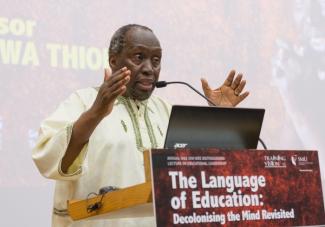
- Third Annual Wee Kim Wee Distinguished Lecture on Educational Leadership
- Distinguished literary, academic and social activist shares renowned decolonisation discourse
- Education policies should be devised on the basis that all languages are treasuries of beauty and possibility
On 24 March 2017, SMU welcomed Distinguished Professor Ngugi wa Thiong'o, who delivered the Third Annual Wee Kim Wee Distinguished Lecture on Educational Leadership themed “The Language of Education: Decolonising the Mind Revisited” at SMU’s Mochtar Riady Auditorium.
The lecture series is based broadly on the theme of Educational Leadership, which involves working towards improving educational processes in order to facilitate improvement and positive change in our communities. Presented by Wee Kim Wee Centre (WKWC) with support from Training Vision Institute (TVI), this was the third session in the series of five lectures.
In his speech opening, Professor wa Thiong'o cited that he shared common roots in words as the late former Singapore President Dr Wee Kim Wee, whom the Centre is named after. Both man began their careers in journalism.
Currently Distinguished Professor of English and Comparative Literature at the University of California, Irvine, Professor wa Thiong'o has frequently been regarded as a candidate for the Nobel Prize in Literature. He is East Africa’s leading novelist, essayist, playwright, journalist, editor, academic and social activist. Students around the world have studied his novels for O-Level, A-Level and university examinations. “A Grain of Wheat”, “The River Between” and “Weep Not Child” are just three of his very well-known works.
A recipient of 10 honorary doctorates, the native Kenyan born in 1938 was educated in Kenya, Uganda, and then the University of Leeds in Britain. He taught and studied in institutions in Nairobi, Germany, Britain, Sweden, and the United States of America. He lived through the British colonisation, the Mau Mau War of Independence, imprisonment and exile, and continued to pen and serve as his and the people’s voices. The prolific literary’s books have been translated into more than 30 languages.
“Decolonising the Mind: the Politics of Language in African Literature” (Heinemann Educational, 1986) is the professor’s collection of non-fiction essays about language and its constructive role in national culture, history, and identity. The book, which advocates linguistic decolonisation, is one of his best-known and most-cited non-fiction publications, helping to cement Professor wa Thiong'o as a preeminent voice theorising the "language debate" in post-colonial studies.
“Decolonising the Mind” is both an explanation of how he came to write in his mother tongue Gikuyu, as well as an exhortation for African writers to embrace their native tongues in their art. The foreign languages most African authors write in are the languages of the imperialists – English, French, and Portuguese – which were relatively recently imposed on them. Professor wa Thiong'o criticises that an educational focus that embraced essentially only foreign works – not only foreign in language, but also in culture – was destructive.
Professor wa Thiong'o elaborated on several examples across the globe of how native languages were ‘weaponised’ by colonisers, and used against native people – from the Kenyans in Africa, the Maori in New Zealand, the Sami in Norway, to the Welsh in Wales. He said this phenomenon was more a war against the colonised than just a question of learning a new language – “it was a question of power”. He added that “the colony of the mind prevents meaningful or nationally empowering innovations in education”.
He articulated unwavering views about decolonisation and the language of education: “All languages, big or small, have a lot to contribute to our common humanity if freed from linguistic feudalism. Hierarchies of languages, is the last stand of colonial classification, and the main ideological pillar of metaphysical empires. Education policies should be devised on the basis that all languages are treasuries of beauty and possibility. They have something to give to each other if their relationship is that of the give and take of network.
“Even if one of the languages should emerge as the language of communication across the many languages, it should not be so on the basis of its assumed inherent nation-ness or globality, but on the basis of need and necessity. And even then, it should not grow on the graveyard of other languages.”
As education is the key for the training of consciousness, the “language” of education becomes critical in terms of the formation of deep-rooted and deep-seated perceptions, values and attitudes. The focus on Educational Leadership works out new frameworks of thoughts vis-à-vis how which we perceive and construct our realities.
About 250 participants attended the lecture, which was followed by an engaging question-and-answer session.
The previous two lectures were delivered by Lord David Alton and Datin Paduka Marina Mahathir.

[Photo (left to right): The question-and-answer session with the distinguished speaker, moderated by WKWC Director Associate Professor Kirpal Singh.]

[Photo: SMU's Mochtar Riady Auditorium was filled with guests listening intently to the lecture.]
[Featured photo: Distinguished Professor Ngugi wa Thiong'o delivering the 2017 lecture.]